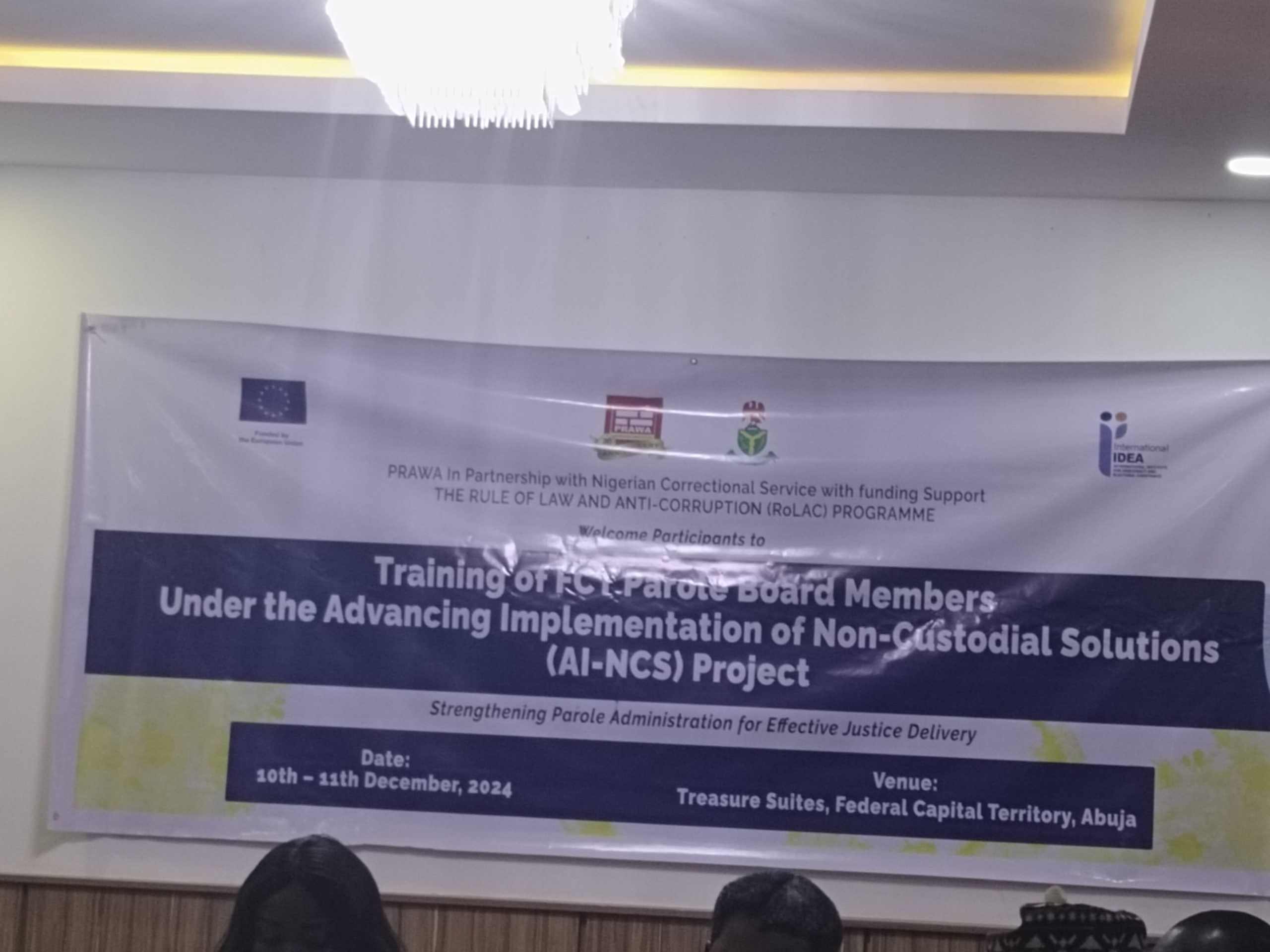Maureen Okpe
Prisoners Rehabilitation and Welfare Action, (PRAWA) in a bid to strengthen the parole administration for effective justice delivery, trained the Federal Capital Territory,(FCT), parole board members.
The training under the Advancement Implementation of Non-Custodial Solutions(AI-NCS) project by PRAWA took place in Abuja, with funding support from the Rule of Law and Ant-Corruption (RoLAC) II programme, International IDEA.
Team Lead Advocacy Implementation of Non-Custodial Solutions Project, PRAWA, Chioma Awuna said, the two-day training is set at building the capacity of the parole board members to effectively carry out the practice and utilise the parole protocol in line with the provisions of the ACJA 2015 and NCS act of 2019.
She disclosed that, in 2019 the Nigerian Correctional Service,NCS, Act made provisions for the utilization of non custodian measures, one of which is parole. Hence the creation of the parole board for different states in 2022.
Earlier in her opening remarks, Awuna stated, the Advancing implementation of the noncustodial solutions project, aims to promote a more equitable and humane justice system in Nigeria.
According to her, this training is a critical step towards addressing the challenges of prison overcrowding which is one major challenge with the custodial center. Adding, this will Improve the rehabilitation of offenders.
Speaking further, Awuna said, after the training participants will be able to implement parole effectively contributing to a justice system that is transformative in nature.
She said, “at the end of this we expect to have a functional parole board for the FCT, a board that will gear towards effective rehabilitation and reintegration of offenders and in overall contribute to the reduction of over crowding.
“This training is majorly designed to enrich members of the FCT parole board with the tools and knowledge necessary to execute their role effectively and FCT is the first board we are starting with.
“It reflects the need to institutionalize parole processes and ensure that they are in line with global best practices as developed by the parole protocol of the NCS.
“We aim to achieve, equipping parole board members with a thorough understanding of the legal framework of parole.To enhance capacity of participants to effectively utilize the parole operational guidelines and protocols of the parole processes.
“Develop skills of parole suitability assessment, monitoring of paroles to ensure adhering to conditions and ensure reintegration back into the community.
“We aimed to foster improved collaboration between the parole board members, correctional officer and other relevant stakeholders for seamless parole administration.
“To facilitate actionable implementation for parole processes specific to the FCT.”
Chairman of the Nigerian Parole Board, Justice Galadima Suleiman for his part stated that, this is the first time in Nigeria a parole board is constituted.
Justice Suleiman emphasized that, the purpose is to see that those who have been doing very well with good record are released on parole however, under supervision .
He highlighted that, “the purpose is to help the correctional service. We are aligning with the parole board act, 2019 and we have the Administration of Criminal Justice Act,ACJA 2015. We do not work independently, but closely with these laws.”
Also, the Director, Directorate of Public Prosecution, Mr. Renson Ingonga, represented by the Deputy Director, DPP, Mr. Yusuf Abdullahi, said this provides access to justice , justice delivery and welfare of the inmates as stipulated in the operational guidelines.
He noted that, “since there is a board in place, they will be expecting more. And government is doing its best in accordance with the best practices in the world, for inmates welfare and conditions of the prisons are catered for.
In the same vein, the Desk Officer Parole Board FCT command, Beatrice Sunday Paul, described the training as a laudable development, expressing optimism that, moving forward everyone that is supposed to be involved in parole get to do what is expected of them.
“We hope that the community appreciate and understand what parole is all about.
“Parole is conditional release of an offender or inmate from correctional center based on some criteria. It is not everybody that gets to enjoy parole.
“The eligibility for parole includes, he/she must have shown remorse, learnt a handwork, make amends and his family must be willing to accept him back into the society. Also the community where the crime is committed will also be willing to accept him, before parole can be considered.”

